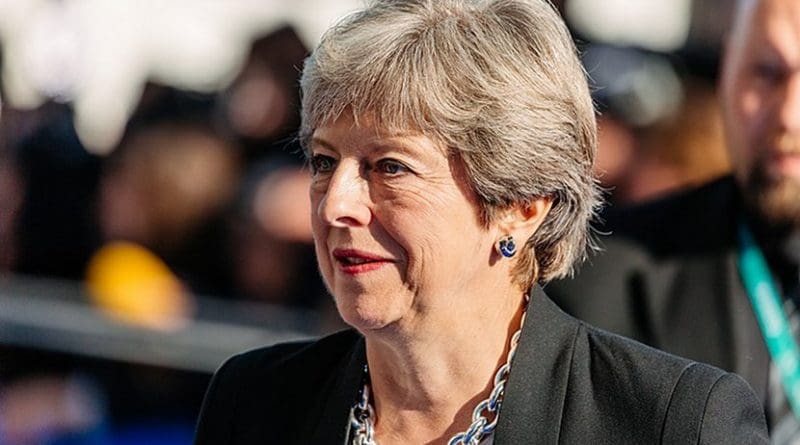Theresa May’s Tough Stance Long Overdue – OpEd
By Arab News
By Zaid M. Belbagi*
A week ago, EU leaders callously shunned the UK’s plan for Brexit at an informal meeting at Salzburg. The so-called Chequers plan, which Mrs. May hammered out with her ministers in July, outlines free trade in goods between Northern Ireland and Ireland and a complicated fix to the customs issue, proposing the collection of EU duties by British officials. Following sneers from EU leaders and haughty warnings form the French president, May issued a new tough new stance on Brexit, during a speech at 10 Downing Street demanding that Brussels treats the UK with respect.
What infuriated the prime minister was that EU leaders had said that the Chequers plan offered a good basis for negotiations.
However, in Salzburg they enthusiastically rejected the plan neither making any counter-proposals nor seeming to seek a working relationship with the UK going forward. This led the prime minister to warn that this would cause an “impasse” and that henceforth the UK would no longer accept underhand negotiating tactics from the EU that in anyway disrespect a nation of such economic and political clout.
The speech, a day after returning from the summit in Austria, called on the EU to spell out its objections to the UK’s plans or indeed to constructively seek alternatives. The prime minister clearly stated, “throughout this (the Brexit) process, I have treated the EU with nothing but respect.
The UK expects the same. A good relationship at the end of this process depends on it.” With 60 percent of the UK public supporting her stance, her increased vigor comes at a critical moment for the country some 200 days ahead of the expected rupture from the trade bloc.
The europhile President Macron, who has hitherto strategically failed to display any real commitment to the bloc’s relationship with the UK, has used the talks to use language that is undiplomatic and divisive. Whereas other European leaders have respected the UK’s referendum outcome, Macron has described Brexit as the choice of “liars” who falsely“predicted easy solutions.”
In also becoming increasingly public in his support for a second referendum he has sought to create division in the UK and to distance sympathetic nations such as the Netherlands, Denmark and Sweden, to more enthusiastically support the guidelines given to EU’s Brexit negotiator, Michel Barnier. Given that the UK is the EU’s second largest single export market for goods and that the EU’s share of global trade is in decline, its relationship with the UK is and will continue to be of great importance. As the fifth largest economy in the world, the UK remains an important facet of future EU prosperity and the prime minister was correct in seeking greater European commitment in seeking a deal.
As Brussels technocrats posture about the kind of Brexit they demand, the UK would do well to remind them of the important role it plays in continental security. Brexit will see the departure of the EU’s largest military force, leaving France as the bloc’s main military power.
As the pace of Brexit negotiations picks up, the role of the foremost global intelligence services in keeping Europe must be amplified so as to remind EU leaders of the importance of seeking an equitable arrangement with the UK going forward.
Now that the prime minister has clearly demanded that the EU abandon short-term political coups and rather fairly and responsibly negotiate with the EU, it seems that Brussels has taken note. Both sides are hoping to see an agreement concerning the UK’s withdrawal to be broadly outlined by mid-October.
However, leaders have also been asked told to block out a weekend in mid-November for an emergency meeting, if required. Whereas the Chequers plan proposes a common rulebook on goods and services, the EU continues to fail in respecting the referendum result when it should rather be seeking a workable relationship between the two parties given shared interests in economic and geopolitical security. Twice within living memory, the UK sacrificed a great deal for the freedom of Europe as continental powers capitulated, EU leaders must look at the broader picture and realize that the UK is a key pillar of their long-term security.
*Zaid M. Belbagi is a political commentator, and an adviser to private clients between London and the Gulf Cooperation Council (GCC). Twitter: @Moulay_Zaid

